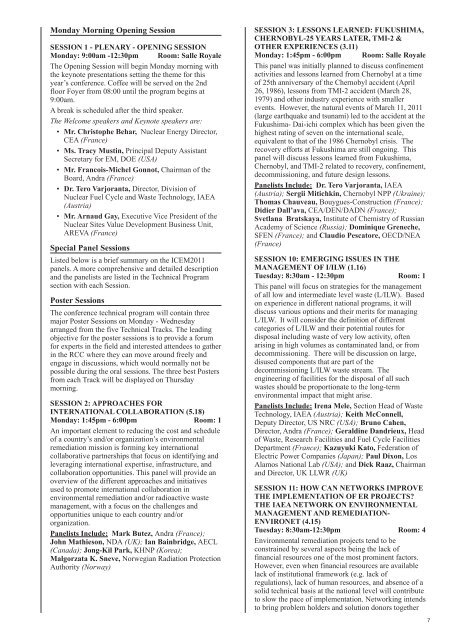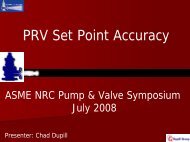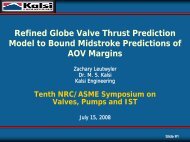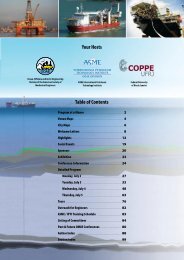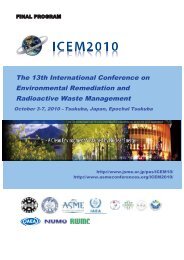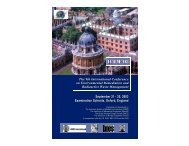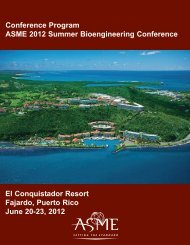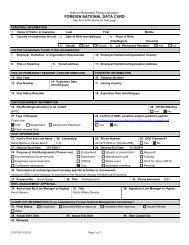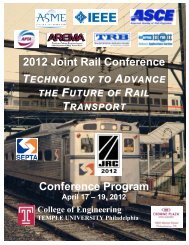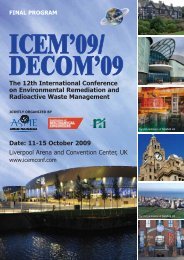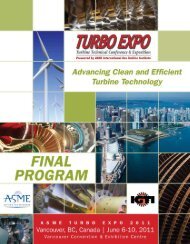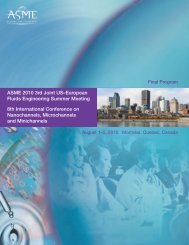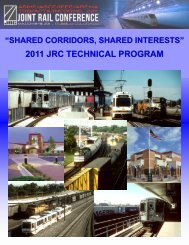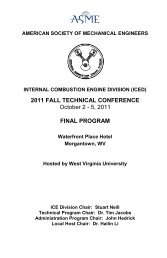ICEM11 Final Program 9.7.11pm_ICEM07 Final Program ... - Events
ICEM11 Final Program 9.7.11pm_ICEM07 Final Program ... - Events
ICEM11 Final Program 9.7.11pm_ICEM07 Final Program ... - Events
You also want an ePaper? Increase the reach of your titles
YUMPU automatically turns print PDFs into web optimized ePapers that Google loves.
Monday Morning Opening Session<br />
SESSION 1 - PLENARY - OPENING SESSION<br />
Monday: 9:00am -12:30pm Room: Salle Royale<br />
The Opening Session will begin Monday morning with<br />
the keynote presentations setting the theme for this<br />
year’s conference. Coffee will be served on the 2nd<br />
floor Foyer from 08:00 until the program begins at<br />
9:00am.<br />
A break is scheduled after the third speaker.<br />
The Welcome speakers and Keynote speakers are:<br />
• Mr. Christophe Behar, Nuclear Energy Director,<br />
CEA (France)<br />
• Ms. Tracy Mustin, Principal Deputy Assistant<br />
Secretary for EM, DOE (USA)<br />
• Mr. Francois-Michel Gonnot, Chairman of the<br />
Board, Andra (France)<br />
• Dr. Tero Varjoranta, Director, Division of<br />
Nuclear Fuel Cycle and Waste Technology, IAEA<br />
(Austria)<br />
• Mr. Arnaud Gay, Executive Vice President of the<br />
Nuclear Sites Value Development Business Unit,<br />
AREVA (France)<br />
Special Panel Sessions<br />
Listed below is a brief summary on the ICEM2011<br />
panels. A more comprehensive and detailed description<br />
and the panelists are listed in the Technical <strong>Program</strong><br />
section with each Session.<br />
Poster Sessions<br />
The conference technical program will contain three<br />
major Poster Sessions on Monday - Wednesday<br />
arranged from the five Technical Tracks. The leading<br />
objective for the poster sessions is to provide a forum<br />
for experts in the field and interested attendees to gather<br />
in the RCC where they can move around freely and<br />
engage in discussions, which would normally not be<br />
possible during the oral sessions. The three best Posters<br />
from each Track will be displayed on Thursday<br />
morning.<br />
SESSION 2: APPROACHES FOR<br />
INTERNATIONAL COLLABORATION (5.18)<br />
Monday: 1:45pm - 6:00pm Room: 1<br />
An important element to reducing the cost and schedule<br />
of a country’s and/or organization’s environmental<br />
remediation mission is forming key international<br />
collaborative partnerships that focus on identifying and<br />
leveraging international expertise, infrastructure, and<br />
collaboration opportunities. This panel will provide an<br />
overview of the different approaches and initiatives<br />
used to promote international collaboration in<br />
environmental remediation and/or radioactive waste<br />
management, with a focus on the challenges and<br />
opportunities unique to each country and/or<br />
organization.<br />
Panelists Include: Mark Butez, Andra (France);<br />
John Mathieson, NDA (UK); Ian Bainbridge, AECL<br />
(Canada); Jong-Kil Park, KHNP (Korea);<br />
Malgorzata K. Sneve, Norwegian Radiation Protection<br />
Authority (Norway)<br />
SESSION 3: LESSONS LEARNED: FUKUSHIMA,<br />
CHERNOBYL-25 YEARS LATER, TMI-2 &<br />
OTHER EXPERIENCES (3.11)<br />
Monday: 1:45pm - 6:00pm Room: Salle Royale<br />
This panel was initially planned to discuss confinement<br />
activities and lessons learned from Chernobyl at a time<br />
of 25th anniversary of the Chernobyl accident (April<br />
26, 1986), lessons from TMI-2 accident (March 28,<br />
1979) and other industry experience with smaller<br />
events. However, the natural events of March 11, 2011<br />
(large earthquake and tsunami) led to the accident at the<br />
Fukushima- Dai-ichi complex which has been given the<br />
highest rating of seven on the international scale,<br />
equivalent to that of the 1986 Chernobyl crisis. The<br />
recovery efforts at Fukushima are still ongoing. This<br />
panel will discuss lessons learned from Fukushima,<br />
Chernobyl, and TMI-2 related to recovery, confinement,<br />
decommissioning, and future design lessons.<br />
Panelists Include: Dr. Tero Varjoranta, IAEA<br />
(Austria); Sergii Mitichkin, Chernobyl NPP (Ukraine);<br />
Thomas Chauveau, Bouygues-Construction (France);<br />
Didier Dall’ava, CEA/DEN/DADN (France);<br />
Svetlana Bratskaya, Institute of Chemistry of Russian<br />
Academy of Science (Russia); Dominique Greneche,<br />
SFEN (France); and Claudio Pescatore, OECD/NEA<br />
(France)<br />
SESSION 10: EMERGING ISSUES IN THE<br />
MANAGEMENT OF I/ILW (1.16)<br />
Tuesday: 8:30am - 12:30pm Room: 1<br />
This panel will focus on strategies for the management<br />
of all low and intermediate level waste (L/ILW). Based<br />
on experience in different national programs, it will<br />
discuss various options and their merits for managing<br />
L/ILW. It will consider the definition of different<br />
categories of L/ILW and their potential routes for<br />
disposal including waste of very low activity, often<br />
arising in high volumes as contaminated land, or from<br />
decommissioning. There will be discussion on large,<br />
disused components that are part of the<br />
decommissioning L/ILW waste stream. The<br />
engineering of facilities for the disposal of all such<br />
wastes should be proportionate to the long-term<br />
environmental impact that might arise.<br />
Panelists Include: Irena Mele, Section Head of Waste<br />
Technology, IAEA (Austria); Keith McConnell,<br />
Deputy Director, US NRC (USA); Bruno Cahen,<br />
Director, Andra (France); Geraldine Dandrieux, Head<br />
of Waste, Research Facilities and Fuel Cycle Facilities<br />
Department (France); Kazuyuki Kato, Federation of<br />
Electric Power Companies (Japan); Paul Dixon, Los<br />
Alamos National Lab (USA); and Dick Raaz, Chairman<br />
and Director, UK LLWR (UK)<br />
SESSION 11: HOW CAN NETWORKS IMPROVE<br />
THE IMPLEMENTATION OF ER PROJECTS?<br />
THE IAEA NETWORK ON ENVIRONMENTAL<br />
MANAGEMENT AND REMEDIATION-<br />
ENVIRONET (4.15)<br />
Tuesday: 8:30am-12:30pm Room: 4<br />
Environmental remediation projects tend to be<br />
constrained by several aspects being the lack of<br />
financial resources one of the most prominent factors.<br />
However, even when financial resources are available<br />
lack of institutional framework (e.g. lack of<br />
regulations), lack of human resources, and absence of a<br />
solid technical basis at the national level will contribute<br />
to slow the pace of implementation. Networking intends<br />
to bring problem holders and solution donors together<br />
7


